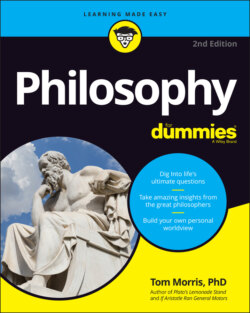Читать книгу Philosophy For Dummies - Tom Morris - Страница 26
Mastering analysis
ОглавлениеPhilosophy as a way of thinking cultivates the ability to analyze complicated problems. It can help you untie mental knots and get to the core of an issue. With an understanding of how philosophy approaches the world, as a big new item in your toolbox, you can get better at breaking problems down into their essential elements, and more manageable components.
Analysis is a skill you need everywhere in life. Lawyers analyze complex claims and sort out the issues; physicians analyze symptoms; detectives look for patterns in the evidence; business people sort through the various parts of an intricate deal; parents try to untangle and get a grip on the issues troubling a family. The skill of analysis is useful in every walk of life. In fact, analysis is so prominent in philosophical ways of thinking that a major trend of 20th-century thought is known as analytic philosophy because of its emphasis on the centrality of this skill. But all good philosophy involves close analysis. Philosophers analyze major problems so that they can sketch out possible solutions, and then analyze those potential solutions for their fitness and truth.
Ultimately, philosophy teaches us how to analyze our lives, with questions like: Who am I? What do I really want and need? What is this life all about? What can make me happy? How can I make my greatest contribution to the world? And: Why didn’t I discover the joy of philosophy much earlier in my life?
In following a philosophical analysis of a major human question and learning from some of the greatest thinkers in history how to tackle a complicated issue, you can become a better analyst of problems and much more analytical in other aspects of your life. Now, this endorsement of analysis is not meant as a suggestion that it’s the most important mental skill, or as a claim that a practice of philosophical analysis is somehow paramount in human life. It’s not. It is, however, important. You can be psychologically paralyzed in many ways if you are unable to analyze your circumstances and opportunities properly. The skill of analysis clarifies your world and liberates you from the vagueness that holds too many people back. As the scientist and philosopher Blaise Pascal reminded us long ago, “Man is but a reed, the weakest thing in nature, but he is a thinking reed.” And thinking well is strength.
Analysis is a vital mental skill. It must, however, be used appropriately. There is a well-known phenomenon, commonly called analysis paralysis, which results when too much thinking actually gets in the way of decisive action — or even in the way of proper emotions. A person can analyze an opportunity or a relationship to death. The unexamined life may not be worth living, as Chapter 1 explains, but the unlived life is definitely not worth examining. Thinking should never replace taking action; it should merely guide what we do. All good things can be misused. And certainly, logical and analytic thinking can be misused. It’s up to each of us to use it well.
My point here is that the better you become at analyzing complex problems, the better off you are at solving them. Analysis is a skill that philosophy cultivates. And it’s a skill for all of life. The real truth about thinking and action is that, if you don’t possess analysis as a life skill, you’re much more likely to experience fruitless confusion in the face of difficulty. Analytical acumen, at its best, liberates. And you’ll find that every chapter in this book will train you in careful analysis, by showing how experienced thinkers tackle some of the thorniest problems you will face as you seek to understand life better.
